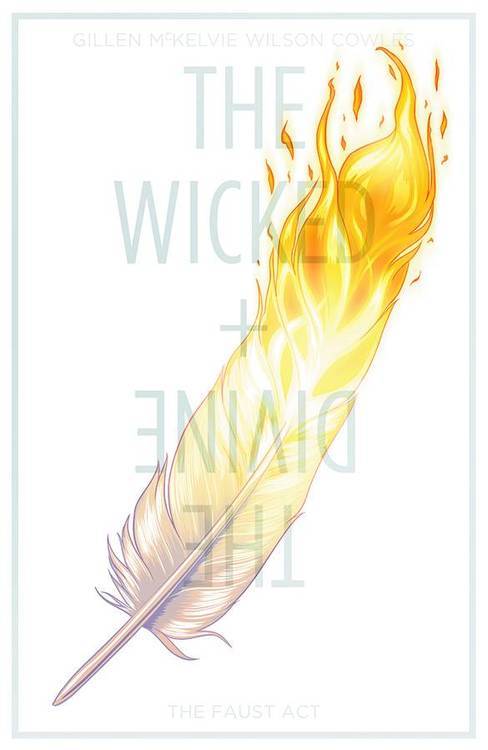Note: I had intended to write a review of each issue as it emerged. However, because I didn’t start reading until the second issue, and I didn’t have a blog at the time, I decided to hold off until the end of the first arc, the cleverly entitled The Faust Act.
Rolling straight off of the success of their recent run on Young Avengers, Kieron Gillen and Jamie McKelvie have between them produced an amazing piece of work. The central idea behind the comic is ingenious, reminiscent of Neil Gaiman’s seminal American Gods and Terry Pratchett’s Small Gods. The story revolves around a group of short-lived pop-culture gods known as the Pantheon, who appear on Earth every ninety years. Each character acts as the avatar of a different god, including a David Bowie-influenced Lucifer and a semi-cyborg Woden. They all have vast, if ambiguous, powers, including the ability to blow people’s heads off by clicking their fingers. More on that later. They are loved and worshiped by thousands- if not millions- of fans-turned-followers. The only downside is that they only have two years to live.

At its base, The Faust Act is a murder mystery. Lucifer is arrested for blowing the heads off a pair of would-be god killers. During the trial, the judge’s head also blows up. This leads Laura on a quest to find the true killer. Laura’s journey leads her through London Underground, Newgate prison, The National Portrait gallery, and many more. One of the triumphs of this series is the way that it captures the quintessential atmosphere of Britain in general, and London in particular. The link between pop gods and pop music is clear, allowing a view of what it means to be a young person living in London today, with the disparate influences of countless different cultures and scenes.

But the gods aren’t entirely the centre of the series. The focus is Laura, a sixteen-year old superfan from London. Laura catches the eye of first Lucifer and then the other gods, and her life is turned upside down when she is invited into their inner circle. One of the most interesting relationships of the series is Laura’s connection with Cassandra, a former student of mythology turned reporter. Like Laura, Cassandra is determined to get in with the Pantheon, if only to expose them as frauds, but is blocked at every turn. The growing friendship between Laura and Cassandra is conflicted by the attitude of the gods to the pair; one is welcomed, the other blocked at every turn. The two mortal characters represent the two extreme response to modern celebrity as Laura’s everywoman status is juxtaposed by her ambition for godhood, while Cassandra’s need to debunk the people that she sees as manipulative fraudsters reflects her own insecurities and identity issues.

The series also explores the power that we give idols and celebrities today. The clash between Baphomet and the Morrigan illustrates it best, as the conflicting egos and power of the two pop gods in their impromptu shared performance threatens to tear the audience apart. But the same idea pops up everywhere. The pop gods don’t worry about accountability the same way that normal people do. They can do things that most of us would only dream of. They can act how they like. They can bend us to their will, just as Woden does with his Valkyries. Watching them perform (Laura refers to it as them ‘speaking’ although what this entails is never completely explored) can put you in a coma. Oh, and they can blow people”s heads off by clicking their fingers.
As with any first arc, the fifth issue l;eaves us with more questions than answers. We still haven’t seen the full Pantheon, and characters like Minerva and Woden only appear briefly. There is still a murderer wandering around, potentially blowing people’s heads off. Is it racist for a white girl from Britain to claim to be the incarnation of a Shinto goddess? Is this the last we’ve seen of Lucifer? And, most importantly, what in the name of Cthulu is Laura going to do now?
The Wicked +The Divine is the best thing in comics since Saga, and ticks many of the same boxes. Each issue is packed with action, emotional drama, humour, and suspense. I mentioned Gaiman’s American Gods earlier, and I would definitely recommend this comic to any fan of his work. This work certainly lives up to its title, and, with its combination of beautiful art, clever visual allusions, crowning moments of awesome, and mind-boggling cliffhangars, I can hardly wait for the start of the second arc. Especially after that final page.
The trade paperback of The Wicked + The Divine: The Faust Act is now available for preorder online.